

ERPCh2Wordle. IFS Study: ERP Too Complicated and Inflexible for the Electric Power Industry. The fact that enterprise resource planning (ERP) software can be confusing and difficult to use should come as no surprise to executives who rely on this type of software to run their organizations (see sidebar).
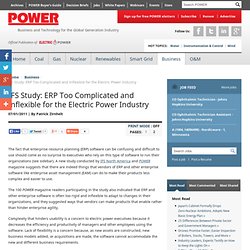
A new study conducted by IFS North America and POWER magazine suggests that there are indeed things that vendors of ERP and other enterprise software like enterprise asset management (EAM) can do to make their products less complex and easier to use. The 100 POWER magazine readers participating in the study also indicated that ERP and other enterprise software is often too rigid and inflexible to adapt to changes in their organizations, and they suggested ways that vendors can make products that enable rather than hinder enterprise agility. Complexity that hinders usability is a concern to electric power executives because it decreases the efficiency and productivity of managers and other employees using the software. 1. Top Five Signs Your Business Needs an ERP System - NetSuite. It's taking longer and longer to reconcile financials at the end of the month.
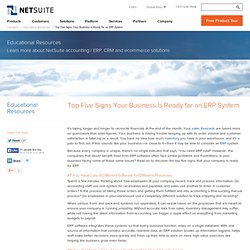
Your sales forecasts are based more on guesswork than solid figures. Your business is having trouble keeping up with its order volume and customer satisfaction is faltering as a result. You have no idea how much inventory you have in your warehouse, and it's a pain to find out. If this sounds like your business—or close to it—then it may be time to consider an ERP system. Because every company is unique, there's no single indicator that says, "You need ERP now!
" #1: You Have Lots of Different Software for Different Processes Spend a few minutes thinking about how employees at your company record, track and process information. When various front- and back-end systems run separately, it can wreak havoc on the processes that are meant to ensure your company is running smoothly. ERP software integrates these systems so that every business function relies on a single database.
ERP: A convincing case must be made before investment. Snyder. ERP Implementation Costs. Why the controversy over ROI from ERP? In other columns that I have provided to Reliable Plant, I have emphasized what should be done to make enterprise resource planning (ERP) a good investment.
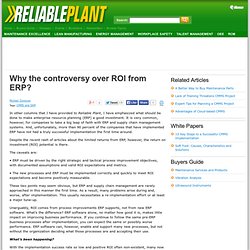
It is very common, however, for companies to take a big leap of faith with ERP and supply chain management systems. And, unfortunately, more than 90 percent of the companies that have implemented ERP have not had a truly successful implementation the first time around. Despite the recent rash of articles about the limited returns from ERP, however, the return on investment (ROI) potential is there. The caveats are: • ERP must be driven by the right strategic and tactical process improvement objectives, with documented assumptions and valid ROI expectations and metrics. • The new processes and ERP must be implemented correctly and quickly to meet ROI expectations and become positively measurable. These two points may seem obvious, but ERP and supply chain management are rarely approached in this manner the first time.
Advantages & Disadvantages of ERP (Enterprise Resource Planning) Systems. In order to understand computer networks better, it would be helpful to have an overview of the applications running on the network.
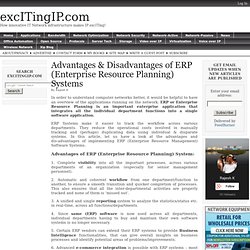
ERP or Enterprise Resource Planning is an important enterprise application that integrates all the individual department functions into a single software application. ERP Systems make it easier to track the workflow across various departments. They reduce the operational costs involved in manually tracking and (perhaps) duplicating data using individual & disparate systems. In this article, let us have a look at the advantages and dis-advantages of implementing ERP (Enterprise Resource Management) Software Systems. Advantages of ERP (Enterprise Resource Planning) System: 1. 2. 3. 4. 5. 6. 7. 8. SAP Project Success Factors with Responsibility Matrix. SAP ROI Success Factors Recently I was reviewing another of many papers I often read on various business and IT topics.
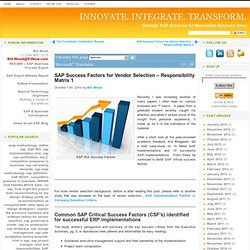
A paper from a graduate student recently caught my attention and while it lacked some of the insight from personal experience, it made up for it in the substance of the material. After a short look at the peer-reviewed academic literature, Anil Bhagwani, did a brief case-study on 10 failed SAP implementations and 10 successful SAP implementations. From these he continued to distill SAP critical success factors. For more vendor selection background, before or after reading this post, please refer to another study that was reviewed on the topic of vendor seleciton–, SAP Implementation Partner or Company Selection Criteria.
The study author’s perspective and summary of the key success criteria from the Executive Summary, pg. 5, is reproduced here (altered and reformatted for easy reading): Why do so many SAP projects come in over budget and over time? Popular Searches: